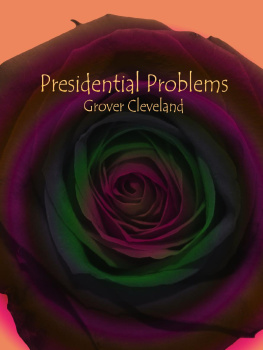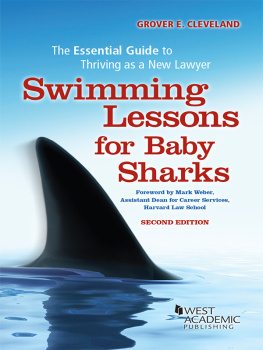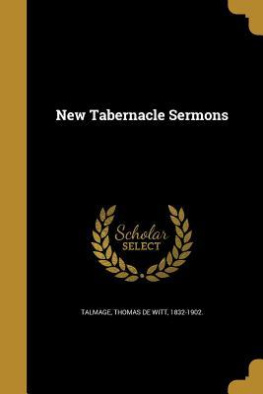Presidential Problems
By
Grover Cleveland
Table of Contents
PUBLISHERS NOTE
Of the four essays comprised in this volume, two were originally delivered as addresses at Princeton University. The other two appeared first in the magazines.
All have now been revised thoroughly by Mr. Cleveland, in preparation for their appearance in book form.
PREFACE
In considering the propriety of publishing this book, the fact has not been overlooked that the push and activity of our peoples life lead them more often to the anticipation of new happenings than to a review of events which have already become a part of the nations history. This condition is so naturally the result of an immense development of American enterprise that it should not occasion astonishment, and perhaps should not be greatly deprecated, so long as a mad rush for wealth and individual advantage does not stifle our good citizenship nor weaken the patriotic sentiment which values the integrity of our Government and the success of its mission immeasurably above all other worldly possessions.
The belief that, notwithstanding the overweening desire among our people for personal and selfish rewards of effort, there still exists, underneath it all, a sedate and unimpaired interest in the things that illustrate the design, the traditions, and the power of our Government, has induced me to present in this volume the details of certain incidents of national administration concerning which I have the knowledge of a prominent participant.
These incidents brought as separate topics to the foreground of agitation and discussion the relations between the Chief Executive and the Senate in making appointments to office, the vindication and enforcement of the Monroe Doctrine, the protection of the soundness and integrity of our finances and currency, and the right of the general Government to overcome all obstructions to the exercise of its functions in every part of our national domain.
Those of our people whose interest in the general features of the incidents referred to was actively aroused at the time of their occurrence will perhaps find the following pages of some value for reference or as a means of more complete information.
I shall do no more in advocacy of the merits of this book than to say that as a narrative of facts it has been prepared with great care, and that I believe it to be complete and accurate in every essential detail.
Grover Cleveland.
THE INDEPENDENCE OF THE EXECUTIVE
I
In dealing with The Independence of the Executive, I shall refer first of all to the conditions in which the Presidency of the United States had its origin, and shall afterward relate an incident within my own experience involving the preservation and vindication of an independent function of this high office.
When our original thirteen States, actuated by a decent respect for the opinions of mankind, presented to the world the causes which impelled them to separate from the mother country and to cast off all allegiance to the Crown of England, they gave prominence to the declaration that the history of the present King of Great Britain is a history of repeated injuries and usurpations, all having in direct object the establishment of an absolute tyranny over these States. This was followed by an indictment containing not less than eighteen counts or accusations, all leveled at the King and the King alone. These were closed or clenched by this asseveration: A Prince whose character is thus marked by every act which may define a tyrant is unfit to be the ruler of a free people. In this arraignment the English Parliament was barely mentioned, and then only as others, with whom the King had conspired by giving his assent to their act of pretended legislation, and thus giving operative force to some of the outrages which had been put upon the colonies.
It is thus apparent that in the indictment presented by the thirteen colonies they charged the King, who in this connection may properly be considered as the Chief Executive of Great Britain, with the crimes and offenses which were their justification for the following solemn and impressive decree:
We, therefore, the Representatives of the United States of America, in General Congress assembled, appealing to the Supreme Judge of the World for the rectitude of our intentions, do, in the name and by the authority of the good People of these Colonies, solemnly publish and declare that these United Colonies are, and of right ought to be, free and independent States; that they are absolved from all allegiance to the British Crown, and that all political connection between them and the State of Great Britain is, and ought to be, totally dissolved; and that as free and independent States they have full power to levy war, conclude peace, contract alliances, establish commerce, and do all other acts and things which independent States may of right do. And for the support of this Declaration, with a firm reliance on the protection of Divine Providence, we mutually pledge to each other our lives, our fortunes, and our sacred honor.
To this irrevocable predicament had the thirteen States or colonies been brought by their resistance to the oppressive exercise of executive power.
In these circumstances it should not surprise us to find that when, on the footing of the Declaration of Independence, the first scheme of government was adopted for the revolted States, it contained no provision for an executive officer to whom should be intrusted administrative power and duty. Those who had suffered and rebelled on account of the tyranny of an English King were evidently chary of subjecting themselves to the chance of a repetition of their woes through an abuse of the power that might necessarily devolve upon an American President.
Thus, under the Articles of Confederation, The United States of America, without an executive head as we understand the term, came to the light; and in its charter of existence it was declared that the articles of this Confederation shall be inviolably observed by every State, and the Union shall be perpetual.
Let us not harbor too low an opinion of the Confederation. Under its guidance and direction the war of the Revolution was fought to a successful result, and the people of the States which were parties to it became in fact free and independent. But the Articles of Confederation lacked the power to enforce the decree they contained of inviolable observance by every State; and the union, which under their sanction was to be permanent and lasting, early developed symptoms of inevitable decay.
It thus happened that within ten years after the date of the Articles of Confederation their deficiencies had become so manifest that representatives of the people were again assembled in convention to consider the situation and to devise a plan of government that would form a more perfect union in place of the crumbling structure which had so lately been proclaimed as perpetual.
The pressing necessity for such action cannot be more forcibly portrayed than was done by Mr. Madison when, in a letter written a short time before the convention, he declared:
Our situation is becoming every day more and more critical. No money comes into the Federal treasury; no respect is paid to the Federal authority; and people of reflection unanimously agree that the existing Confederacy is tottering to its foundation. Many individuals of weight, particularly in the Eastern district, are suspected of leaning towards monarchy. Other individuals predict a partition of the States into two or more confederacies.
It was at this time universally conceded that if success was to follow the experiment of popular government among the new States, the creation of an Executive branch invested with power and responsibility would be an absolutely essential factor. Madison, in referring to the prospective work of the convention, said:
Next page



